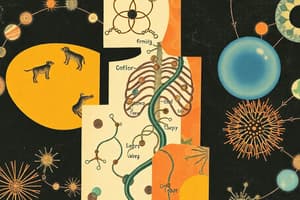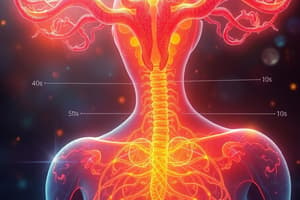Podcast
Questions and Answers
The islets of Langerhans are part of the exocrine portion of the pancreas.
The islets of Langerhans are part of the exocrine portion of the pancreas.
False (B)
The pineal gland produces the hormone melatonin, which helps regulate blood sugar levels.
The pineal gland produces the hormone melatonin, which helps regulate blood sugar levels.
False (B)
Peptide hormones are derived from cholesterol.
Peptide hormones are derived from cholesterol.
False (B)
Positive feedback loops in hormone regulation lead to decreased hormone secretion.
Positive feedback loops in hormone regulation lead to decreased hormone secretion.
Hyperthyroidism is characterized by weight loss due to decreased metabolism.
Hyperthyroidism is characterized by weight loss due to decreased metabolism.
Hormones are essential components of the endocrine system, regulating various physiological processes and functions.
Hormones are essential components of the endocrine system, regulating various physiological processes and functions.
The endocrine system is responsible for maintaining the body's internal equilibrium through the secretion and regulation of neurotransmitters.
The endocrine system is responsible for maintaining the body's internal equilibrium through the secretion and regulation of neurotransmitters.
Hormones are not essential for growth, metabolism, or reproduction.
Hormones are not essential for growth, metabolism, or reproduction.
The pituitary gland is often known as the 'master gland' and produces hormones that regulate growth and metabolism.
The pituitary gland is often known as the 'master gland' and produces hormones that regulate growth and metabolism.
The thyroid gland secretes insulin, which regulates metabolism and cellular activity.
The thyroid gland secretes insulin, which regulates metabolism and cellular activity.
The parathyroid glands regulate calcium and sodium levels in the blood.
The parathyroid glands regulate calcium and sodium levels in the blood.
The pancreas has only exocrine functions and is not involved in the endocrine system.
The pancreas has only exocrine functions and is not involved in the endocrine system.
Flashcards are hidden until you start studying
Study Notes
Hormones: Regulators of Life's Balance
The endocrine system, a complex network of glands and cells, is responsible for maintaining our internal equilibrium through the secretion and regulation of hormones. These chemical messengers are essential for growth, metabolism, reproduction, and numerous other biological processes.
The Endocrine System
The endocrine system consists of various organs and glands that produce hormones, which are then released into the bloodstream. These hormones travel throughout the body, interacting with specific target cells to elicit responses. The primary organs involved in this system include:
- Pituitary gland: Located at the base of the brain, the pituitary gland is often referred to as the "master gland." It produces various hormones that regulate growth, metabolism, and the function of other endocrine glands.
- Thyroid gland: Located in the neck, the thyroid gland secretes thyroid hormones, which regulate metabolism and cellular activity.
- Parathyroid glands: Four tiny glands located on the back of the thyroid gland, the parathyroid glands regulate calcium and phosphorus levels in the blood.
- Adrenal glands: These glands, located atop the kidneys, produce hormones that regulate the body's response to stress and help maintain blood pressure and electrolyte balance.
- Pancreas: The pancreas has both endocrine and exocrine functions. The endocrine portion, called the islets of Langerhans, secretes hormones that regulate blood sugar levels.
- Gonads: The testes in males and ovaries in females produce sex hormones, such as testosterone and estrogen, which regulate reproduction and secondary sexual characteristics.
- Pineal gland: The pineal gland, located in the brain, produces the hormone melatonin, which helps regulate sleep patterns.
Hormone Classification
Hormones can be classified based on their primary functions or chemical structures. Some common classifications include:
- Peptide hormones: These hormones are made from amino acids and include growth hormone (GH), oxytocin, and vasopressin.
- Steroid hormones: These hormones are derived from cholesterol and include estrogen, testosterone, and cortisol.
- Amino acid-derived hormones: These hormones are derived from amino acids and include thyroxine (T4) and thyroid-stimulating hormone (TSH).
Regulation of Hormones
The endocrine system is regulated through a complex network of negative and positive feedback loops. Negative feedback loops involve the action of hormones on their target cells, leading to decreased secretion of the hormone. Positive feedback loops lead to increased hormone secretion. Hormones can also interact with other hormones to regulate their own secretion.
Hormone Disorders
Disorders related to hormone production, secretion, or action can lead to a wide range of health issues. For example, overproduction of thyroid hormones (hyperthyroidism) can lead to increased metabolism and weight loss, while underproduction (hypothyroidism) can result in fatigue and weight gain. Similarly, hormone disorders related to the pituitary gland can lead to growth deficiencies, fertility issues, or obesity.
In conclusion, hormones are essential components of the endocrine system, serving as chemical messengers that regulate various physiological processes and functions. Understanding the role of hormones in the body can help us appreciate the intricate balance required to maintain good health.
Confidence: 95%
Studying That Suits You
Use AI to generate personalized quizzes and flashcards to suit your learning preferences.




